By Blaine Taylor
For MarylandReporter.com
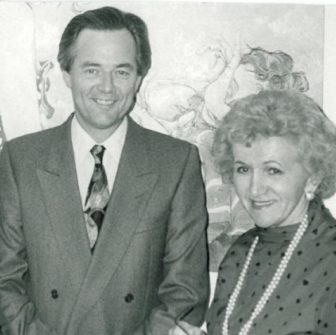
Blaine Taylor and Helen Bentley in 1992 when he served as her press secretary. From Taylor’s arichives
Now that she’s gone, some people doubtless may claim to know the “real” Helen Delich Bentley, but I doubt if any one person ever did—not even she herself. She was at once both simple and complicated, many different personas within one stocky frame, a human powerhouse on two feet, such as we will not see again in my lifetime.
I believe that my own relationship with and to her was near unique in many ways, in that I both ran with and against her, covered her as a reporter and feature writer, and lastly worked for her as a Congressional press secretary on Capitol Hill during 1991-92, a generation ago now. Over time, I received her anger and her praise, as well as her disappointment.
We could’ve accomplished many more things together than we did, but our differences over America’s possible military ground involvement in the Yugoslavian civil war drove us apart for good in the end. Although in general working for peace in the former Yugoslavia as I believe she did on one level, on another, subliminal plane, she pushed for a larger American ground commitment to ensure that her ancestral Serbia would defeat Croatia. This would be in a war I felt would lead to the deaths of thousands of US soldiers in a region that had tied down over a dozen German divisions in World War II.
Foundering on Serbia
That I would not have, as a veteran of America’s similar civil war in Vietnam during 1945-75, in which I served before first meeting her in 1973. So we lost each other during 1992 up to and including her sad demise. In his actions, then President George H.W. Bush (#41) wisely came down on the side of minimal American involvement, as opposed to a more massive U.S. presence, a policy continued under his successor, President Bill Clinton. This was the hidden pivot around which her political career foundered, and in the final analysis, Serbia was her ultimate undoing, her Waterloo.
Now that she has become an historical figure, we will be joined together anew yet again, as we were at the start, as subject and biographer, political rivals no longer. In this we were destined for one another, and for that I am grateful.
Some personal memories follow of my time getting to know this most unusual and multi-faceted person of my parents’ generation, a child of the great victory of 1945 who outlived her era, only to witness the current dismal offshoots of that magnificent achievement of her younger years. What must she have thought of where we had come over those succeeding decades? I often wondered.
Dancing partners
As a boy, I believe that my own young friends and I played on Helen Delich Bentley’s front lawn when she and her late husband, the teacher and antiques dealer Bill Bentley, lived on Belvedere Avenue in northeast Baltimore in the 1950s, and I lived in nearby Govans. Then single Sun reporter Helen Delich of Nevada discovered that she and Bill Bentley shared a common passion for dancing, and it was that which brought them together. I once asked her what she thought of meeting superstar actor Tom Cruise: “Bill is better looking!” she quipped, not missing a beat.
Decades later, she reveled in displaying her dancing skills doing the polka before adoring onlookers at her many political fundraisers, with partner Elwood Gurklis.
In October 1992—one week before I left HDB’s employ on Capitol Hill—I introduced her at one such event at the Museum of Business and Industry on Key Highway. This was shortly before she won that year’s General Election—her last win, alas—for her triumphant return to Congress and her last term therein. George H.W. Bush 41 lost the presidency to Gov. Bill Clinton of Arkansas that year as well, just as I’d predicted to her would happen earlier after she had assigned me to work in the winning GOP Maryland Primary in which Bush defeated Republican challenger Pat Buchanan.
Having narrowly come into office with a winning Ronald Reagan in 1984 to defeat then veteran Democratic warhorse Rep. Clarence Long, she feared eight years later that she might very well go out on the losing coattails of a beaten Bush, but survived.
Watching her on TV
In introducing her, I stated that, as a child, I’d always watched her Saturday afternoon television show on WMAR-TV, “The Port That Built a City and State.” In her reply, Congresswoman Bentley wailed to the amused crowd, “Blaine Taylor, you really know how to hurt a person!” We all laughed.
A week later, I was gone, and launched a book-writing career that endures 24 years later. She ran for governor of Maryland two years after what proved to be her fifth and final Congressional term, lost, then tried to regain that former seat in 2002, and lost that as well, to the still current incumbent, Democratic Congressman Dutch Ruppersberger, who in turn defeated me in 2014.
On my very first day on the job with her as first, press aide and later press secretary, I asked her what she wanted me to call her, By then I’d already known her for 19 years, starting out as her interviewer for Baltimore magazine. She said, “Congresswoman Bentley,” or “Mrs. Bentley,” and so we began.
The bag lady
That was also the first time that I drove to her house in Lutherville to take her to Washington, a task for which many of us staffers took turns. We called her, “the bag lady,” since we had to load all her many bags stuffed with files from her kitchen entry way into the car for the drive over to the Nation’s Capital, during which she worked on them, and was also on the car phone for much of that same time—“multi-tasking,” as it’s now called. She hated wasting a second.
When we arrived at the Longworth House Office Building, one of the policemen at the door gave me a quizzical look as I lugged them all in, to which I merely said, “Congresswoman Bentley.” He smiled and rolled his eyes.
One time at night in a snowstorm outside her then Joppa Road district office in Towson—half a block from where I’ve lived for the last 17 years—she’d driven me back to her office in the red brick Shell Building from what we called “the house” to my own car, parked on our lot there. It would start, but I had a hard time getting it out of a snow bank.
Pushing and running
She got out and started pushing—at 68—with me, 45, still at the wheel. I looked at her and said to myself, “This isn’t right.” I got out and changed places with her, and we got the car moving. That was vintage HDB, tackling head on whatever was the job at hand, title and position going by the wayside.
Another time, we were getting gas for her car at the Exxon station on Joppa Road directly across from our district office. She’d forgotten something, and decided to go back to the office while I finished pumping the gas. She was a little chunky, but still she managed to run across Joppa Road—dodging the cars of the early morning rush hour!—and this made me smile, as I thought to myself, “She can run!”
Never lost
She had a great sense of direction, and no matter where we found ourselves—in Baltimore, Annapolis, or Washington—she always knew where she was at all times. I never knew her to be lost, not once.
To her credit, she rarely asked me to work on a weekend. That was my time off, and she let me have it, too. I was grateful for that no end.
Was she inherently afraid of blacks? I think maybe so. Since part of my growing up had been in mixed race Waverly during segregation in the city during 1957-61, I knew them, and wasn’t afraid.
On my first day on the job in Towson, she had me face a black demonstration outside our office, while she was in her office on Capitol Hill. I forget now what it was even about, but it went OK.
Toward the end of my time with her, we had a parade in Patterson Park that would go through some black residential areas. I could tell that she was worried about it, so I quietly said to her, “Don’t worry. It’ll be OK, and you’ll do all right. Just be yourself, and they’ll respond to that just fine.” She did and they did, and I know that she was happy about it, too.
Ice cream sandwiches
Then there was the saga of the ice cream sandwiches one time in our DC office. She walked up to my desk holding an open box of them, and then just stood there, saying nothing, staring at me, waiting. I didn’t know if she wanted me to take one, take the whole box and distribute then, or put it in the refrigerator.
Finally, she blurted out, angrily, “Take one!” and stalked off in a fury, scowling. As a very shy person myself, I understood her dilemma, and felt sorry for her at being what she felt was embarrassed. It wasn’t easy being her, I know.
I drove her to the airport once so that she could catch a plane for a one-day hop to London and back. Who does that? She was going to do a TV interview for the BBC!
I said that she could do that from the Capitol’s own TV studio, but she wanted to go, and always flew First Class. She was growling in her usual Mama Lioness mode as we arrived, and just as she started to get out, I stopped her with, “Give me a smile!” She asked me why. I said, “Because, if the plane goes down, I don’t want my last memory of you being with a frown on you puss!” She smiled, laughed, and was off to Great Britain.
Getting along
I could get away with that because of my age then relative to hers, and, also, because I wasn’t afraid of her, and she knew that. I was then old enough to at least have heard of most of the people she knew from the 1940s up through the 1990s, but still young enough to connect with all the much younger staffers we had working with us.
It helped, too, that I had actually debated her on Maryland Public Television during the 1982 Congressional race—discussing nuclear weapons and Israel—when I was a Democratic candidate and she was running the second time of three for the GOP nomination. I lost and she won.
I was always respectful with, of, and to her, never called her by her first name in all the years I knew her, but was never in awe, and she knew that, too. We all admired her—and still do. She created an empire by having too many of “the kids” in our various offices, not paying any of them enough. Less staff would have been better, I felt, all the way round, but, then again, that was how I was hired when I suddenly needed a job. I asked for her help, and she came through for me at the last moment.
Awful staff meetings
Her staff meetings were just awful, dragging on for well over an hour and more, with people droning on and on. One particular meeting that stands out in my memory occurred on a Friday night after hours in her ornate Capitol Hill office in Washington, with the staff all gathered round her like the adoring—but very tired—puppies we were. She loved that, but little really got done.
We all wanted to go home, but on it went. She didn’t actually run it, and the problem was that no one else did, either, so we just went round and round saying whatever popped into our little noggins, already weary from the day’s work. When it ended, we were all glad to leave, and those of us from the district still had a long drive ahead in rush hour traffic out of DC. Still, everyone got to say what was on his or her minds, and that was positive.
Little cussing
For a person who was—historically and famously—renowned for her alleged swearing, I can honestly say that I only heard her do so twice—and neither time at me! I think that the media seized on that and made more out of it than it really was.
One time, I heard HDB singing at one of the many Baltimore County Democratic Clubs at which she was regularly allowed to speak. As we left the building, I told her, “Rosemary Clooney, you ain’t!” and we both laughed at that one. She wasn’t so thin skinned that she couldn’t laugh at herself, and did.
We all liked her affable husband Bill, and I felt sorry for him, too. She rarely saw him very much while she was in office, accept that she did return home from The Hill every night—except for once that I recall—when she stayed over in DC for an important vote .
One morning when I arrived at her house to pick her up, I asked Bill how her cold was doing. He didn’t even know that she had one. She’d come in late at night, and would sit in an old plush chair in her basement making telephone calls until she fell asleep there, phone receiver cradled between her neck and shoulder. I often wondered if she ever actually went to bed, or just got up from there at dawn, and started over.
When former President Gerald Ford died, I noted with a silent smile that she was included in the official receiving line on TV to walk past former First Lady Betty Ford at the Capitol, as she had been a Nixon-Ford appointee as chair of the Federal Maritime Commission.
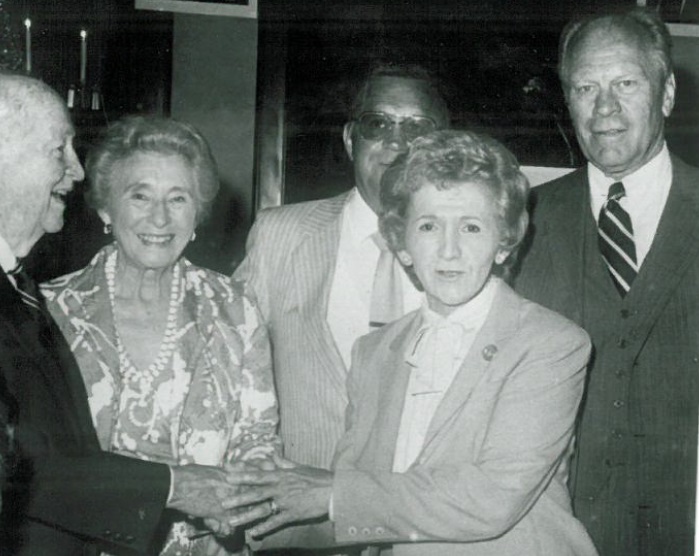
From left, former 2nd District Congressman James Devereux, Mrs. Devereux, an unknown man, Helen Delich Bentley, and former President Gerald Ford. From Taylor’s archives.
Not concerned about history
She never forgot her place in the overall order of things, either, but, oddly, she never really cared very much about the past until after her last two lost electoral defeats. The first was by Del. Ellen Sauerbrey in the GOP primary for governor in 1994 and the last by Dutch, whom she genuinely liked, even joking with him onstage at Towson University’s Stephens Hall during their sole campaign debate.
Our Towson district office’s staffer Mrs. Doris Kuhar of Dundalk helped organize the massive HDB files that are now on deposit in the Langsdale Library downtown at the University of Baltimore, a project that I had urged upon the busy congresswoman before I left.
In general, Mrs. Bentley’s focus was always on now, and not yesterday, much less yesteryear! Historians of the future will be glad that in her defeated years in the political wilderness, she had the time to properly sort out all the papers and photographs, as well as all the hundreds of hours of tape from her truly historic television shows.
Friday nights were the worst
Friday nights were always the worst for her, because there was nowhere to go, other than to the hairdressers in the building where I now live. She was, essentially, a very lonely person, and always wanted someone to stay after work with her during what were, for her, down times.
One such evening in Towson, she and I were in her office watching the national TV news. President Bush 41 came on and said, “Our State Department is recognizing the just proclaimed independence of the three breakaway Baltic Sea Republics of Latvia, Estonia, and Lithuania from the former Soviet Union.”
I said to her, “We don’t have to do that, because we never recognized their conquest by the USSR in 1940 as being legitimate in the first place.” She immediately picked up the phone, dialed a number, and barked out, “Gimme Bush!” The President had made that statement at a press conference held at his summer White House in Kennebunkport, Maine. When he came on the line, she repeated to him exactly what I had just told her. The very next morning—a Saturday—President Bush gave another press conference, stating, “We’ve checked with our State Department, and found that we don’t have to recognize their independence, because we never recognized the Soviet invasions of 1940,” and thus history was made, and she had graciously allowed me to participate therein—literally!
Another mark of esteem, kindness, and thoughtfulness toward us staffers, was to make sure that she took all of us in groups to at least one meal in the House dining room at The Capitol—at her expense—to ensure that, back home, we could say that we’d been there.
The White House egg roll

President George H.W. Bush in a 1992 campaign stop in Maryland with Helen Bentley, Anne Arundel County GOP Committeeman Walt Stealey (back to camera), and the developer Henry A. Knott Jr. Photo by Blaine Taylor
In the spring of 1992, the feisty Congresswoman attended the annual White House Easter Egg Roll on the lawn as an invited guest of President Bush. She took the occasion to pester the President about the civil war in Yugoslavia. I heard second hand from our assigned driver that day, that Bush got mad at her, shouting, “Jesus Christ, Helen, we’re at the White House Easter Egg Roll!” and had her escorted off the grounds. She didn’t care, and she never gave up, either.
Along these same lines, my late longtime friend Gene Sweetland—a former treasurer of the International Longshoremen’s Association—recalled for me the day when he’d seen her picked up and bodily ejected from one of their meetings during the 1950s when the Baltimore waterfront was still a rough and tumble place for any lone woman to be.
She could have that effect on people sometimes, too. In fact, she was the only person I’ve ever known whom you could both love and hate, and all within the first five minutes of being with her, too!
One night, I drove her to an ILA fundraising dinner at Martin’s East on Pulaski Highway in Middle River. As we sat there and I looked around at the faces in the crowd, I said to her, “These guys look like a bunch of gangsters!” at which she chortled straightaway, “Many of them are!”
Our first blowout
One day in the car—a rugged Ford Taurus station wagon that handled like a tough little tank— she only bought American by the way!—we were headed to the WCBM radio station in Owings Mills for an appearance on the Les Kinsolving Show.
I decided after two weeks with her daily that I’d had enough of her browbeating me verbally. I pulled the car over onto the Beltway’s shoulder, and she asked why I was stopping. I said, “I’m not talking any more crap off of you, and I’ve got more news for you, too: you’re not the only person with a hot temper in this car!”
She replied, sheepishly, “It’s just my way,” to which I said, “Well, it’s not my way! Now, if you don’t stop, I’ll get out here and walk home to Towson. So, what’s it going to be?” She promised to be better, and was.
After that, we had a couple more such blowouts, but never over Serbia, for on that one issue alone, I knew that I could never talk to her, because she didn’t think I knew anything about it.
Obsession with Serbia
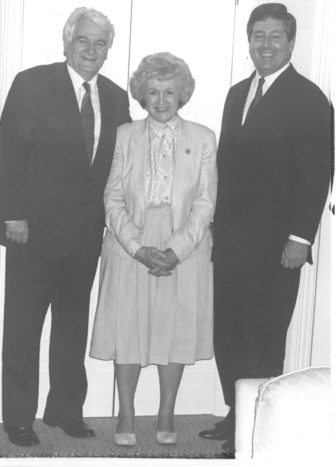
From left to right: Serbian opposition party head Dragoljub Micunovic, Helen Delich Bentley, then the sole Serbian-American Member of Congress, and the former Crown Prince Alexander of Yugoslavia, meeting at a Washington hotel in 1991. Photo by Blaine Taylor
She wasn’t elected governor partially as the result of her obsession with her family’s inbred Serbian nationalism, and it hurt her bid trying to return to Congress as well. Thus, she ended her long life with 22 years being out of office, a bitter and lonely exile from the power that she lived, breathed, and loved so well.
The same was true of being lionized in public, a trait that she shared with her longtime fan and contemporary, the late William Donald Schaefer, whom I knew equally as well — the greatest Maryland political figure of my time, bar none. Hardheaded Serb that she was, she brought her fall entirely on herself, as many of us do, but she never renounced Serbia, no matter what.
Most of our one-on-one discussions were in the car, wherein I asked her once why she wanted to run at all for governor, and she answered, “Because of all the appointments I can make for the Republican Party.”
True, I hadn’t considered that, but I urged her not to give up what then appeared to be a safe, lifetime seat in Congress—unless it was to run for the United States Senate or President. She had just come from viewing the body of the late Rep. Claude Pepper of Florida, who’d died in office at age 88. I said to her—relative to her staying in Congress—“That could be you.” In retrospect, I think that she regretted not keeping her seat, but by then I wasn’t around anymore to ask her.
Ehrlich takes her seat

In 2006, Gov. Bob Ehrlich named the Port of Baltimore for Helen Delich Bentley, whom he had succeeded in Congress in 1995 after she ran for Congress.
On the other hand, she might very well have someday faced an insurgent intra-party GOP congressional challenge from then Del. Robert Ehrlich from the right wing of their party that duly ejected her in 1994 anyway. After all, that was precisely how Bobby had earlier entered the Maryland House of Delegates, by beating an incumbent GOP stalwart.
She didn’t have much use for Bobby while I was there, and was NOT looking forward to him succeeding her. Whenever I mentioned him as a possible worthy successor, she gave a grunt that ended that line of talk. In retrospect I will always be glad that as governor, he named the Port of Baltimore after her, as important as having her late friend and ally Willie Don’s statue looking out over the Inner Harbor from Harborplace, he keeping silent vigil.
Bobby had her number, though, and thus cannily waited to award her that signal honor until late in his term. That, I believe, was his subtle and effective way of keeping her in line, and thus also out of his famous hair.
He knew her well enough! So, too, did now former GOP Baltimore County Executive Roger Hayden. In the first few months of the Hayden regime at Towson, she was calling him on the phone daily—telling him what to do—until I’m told he refused to take any more of her calls. That didn’t surprise me in the least, either!
William Donald Schaefer
Before I’d accepted the job with her, then Gov. William Donald Schaefer thought that I was coming to work for him, just as he had once before when he thought he’d hired me to work with him at City Hall during his mayoralty.
In both cases, he never got back to me, and thus HDB hired me first the second go-round. We ran into him at a dinner downtown in one of those swanky hotels on the Inner Harbor, in a ballroom. Going in, she ordered me to park in a posted no parking zone just opposite the front door. As always, she was deliberately late, and this was so she wouldn’t waste her time and so that she could make the grand entrance.
With all eyes present, she could star as the inveterate drama queen that she was. As we walked by him, a city cop in the driveway gave us a hard look, to which she barked out gruffly, “Congresswoman Bentley!” and proceeded, Moses-like, parting the Red Sea of massed humanity in her path regal.
When her pal the governor saw me after greeting her and she went on, he boomed out to me, “Well, how is it working for her?” with a mischievous glint in his eye, since he well knew her reputation as a hard taskmaster, just as he was. I answered, puckishly, “Well, it’s sort of like being married, except that she wants to be on top all the time!”
Later, when I repeated that story to her proper campaign financial aide Tom O’Neill, he was appalled, stating, “You didn’t say that to the Governor of Maryland, did you? What did he do?” I replied, “He laughed so hard that I thought he was going to fall off his chair and onto the floor!”
Had Mrs. Bentley been elected governor in 1994 and later been on the Board of Public Works with then Comptroller Schaefer, I don’t think that their famed long friendship would’ve lasted, as both always wanted to be top dog on the porch. Sooner or later, it would’ve been a battle royal between Emperor William versus Empress Helen.
I was in Annapolis the night that Schaefer first filed for Comptroller. Driving past the small building that then housed the State Board of Election Supervisors, I saw Mrs. Bentley standing outside. I said to my car mate, “Look, there’s Mrs. Bentley! I’ll bet you that if Schaefer doesn’t file, she will!” I still think that was an accurate assessment, too.
How she get her tugboat nickname
Here’s how—according to legend and lore—she got her now largely forgotten nickname as Tugboat Helen. During the time that she was the maritime editor of the Baltimore Sun for 25 years, she allegedly once stood on the top of tug as it passed under a bridge. On the bridge as the tug passed by, another reporter was waiting to take from her hand her bylined article so that he could drive it to the paper’s city room and file it for her.
This was in those now ancient times of yesteryear when computers were as yet unknown, much less cell phones!
Also now forgotten in the misty shrouds of medieval early Hellenic hagiography is that she was never photographed without wearing one of her much famed hats.
Suddenly—after decades—they simply disappeared in 1969, even after they’d been profiled in the local papers, complete with photos. I thought I knew why, too, so I popped the question: “Did you stop wearing them because of Bella Abzug’s fame in Congress for her hats?” Glumly, she admitted it was so.
Hated being upstaged
She hated being upstaged, always wore red during Presidential State of the Union messages before joint sessions of Congress, and sat in aisle seats to get on TV and shake the President’s hand as he passed by to the podium.
One who did upstage her was the still reigning Queen Elizabeth II when she spoke before Congress. Tugboat was so miffed at that happening that she refused to go that night to the just opened Camden Yards stadium because Her Majesty—and not her—would again be the center of attention.
Famously, she could dish it out, but often couldn’t take it. Now former delegate and Baltimore County Council member Joe Bartenfelder, now secretary of the Maryland Department of Agriculture once told me, “She takes credit for a lot of things she doesn’t do.” He was referring to contracts announced by the Federal government affecting Maryland that included her name in the press release as a courtesy, but also to win her vote for their next budgets on the Hill.
I asked her what it was like during the decade of 1975-85 in between being maritime commission chair and then elected to Congress. Her eyes flashing angrily, she hissed, “When you’re out, you’re out!” so she well knew what was in store for her these last 22 years.
I long ago concluded that the secret of her being at her innermost core was the tough childhood that she endured in the silver mining towns of her youth in Nevada where she was the unknown Serbian girl Helen Delich. Therein lies the true story of all that came afterwards, a saga that may never be fully known, because she hardly ever talked about those years, unless directly asked. I never once heard her mention any member of her family.
In the final analysis, therefore, she was, in my view, a duckling who became a swan, but never quite believed it, and then—suddenly, without warning!— it was all over. I both knew and understood her well enough.
Those of us who knew her best all loved her, still do, and always will, too. I miss her already.
Towson, Md. freelancer Blaine Taylor is the author of the 2013 book, “Dallas Fifty Years On: The Murder of John F. Kennedy—a New Look at an Old Crime, 22 November 1963-2013” and numerous other books of history and biography.

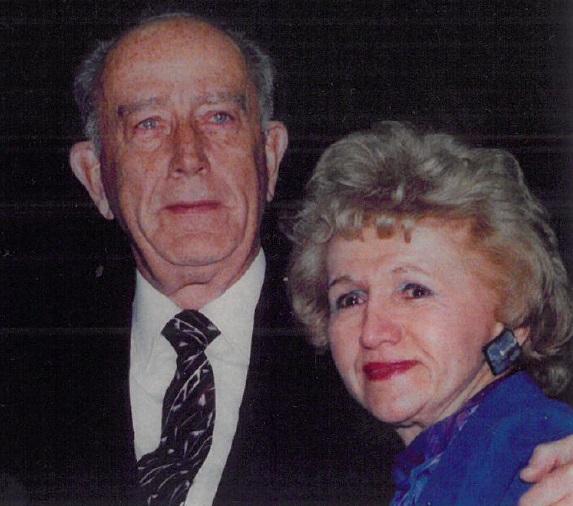
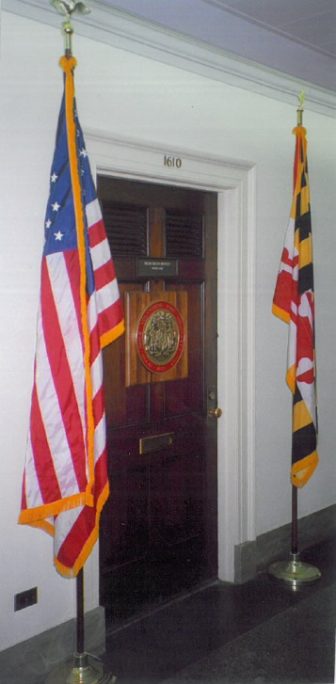


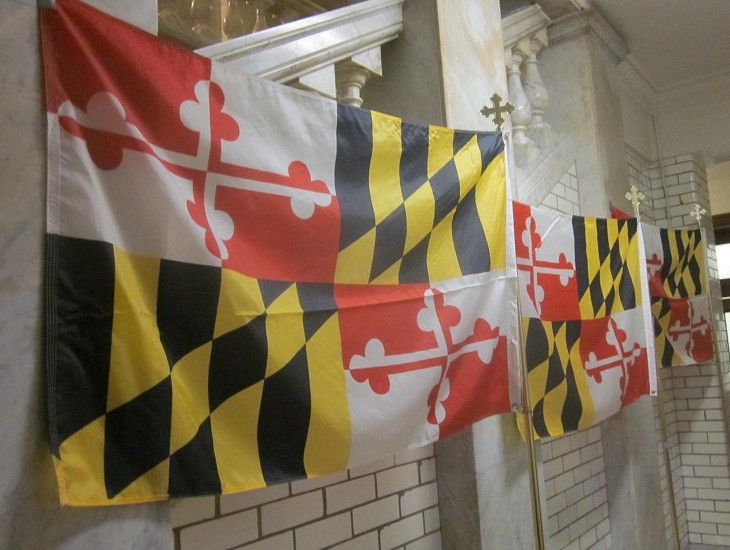

There have been many fitting tributes to Helen Bentley this past week. This is not one of them. Blaine Taylor is a self-aggrandizing failure of a man who has concocted a bunch of fiction to try and make himself much more significant than he ever was. According to friends who were actually close to Helen at the time, their only memories of Blaine Taylor during the period in question are his heavy drinking and regular threats of suicide. As before he is trying to ride Helen’s coattails to his 5 minutes of fame.